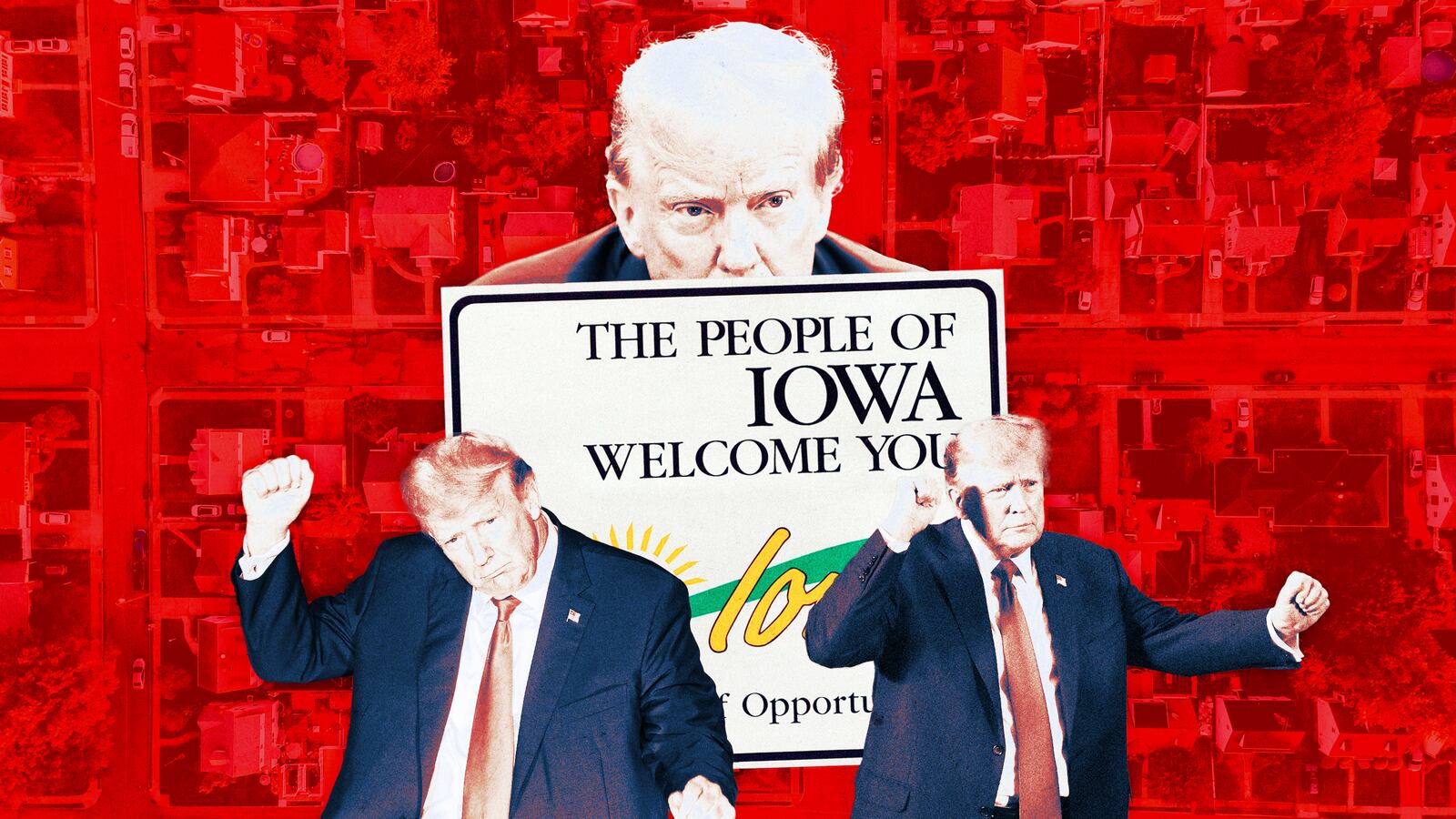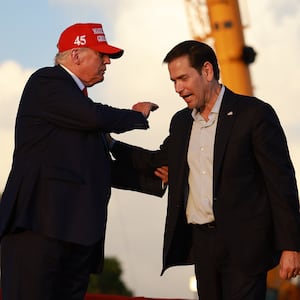INDIANOLA, Iowa—When the Iowa caucus results come in Monday night, Donald Trump could be thanking the evangelical conservatives who detested him in 2016—and now worship him in 2024—for crowning him with a historic margin of victory.
But there’s another constituency in the state that may also be key to handing Trump his third consecutive GOP nomination and a potential second term.
Ever since Trump came to rule the Republican Party, suburbanites have been among the most MAGA-skeptical demographics, coming out to vote in increasingly strong numbers and helping Democrats in multiple elections.

Former President Donald Trump campaigns in Indianola, Iowa.
Brendan McDermid/ReutersNikki Haley is currently banking on her suburban appeal to break into Trump’s commanding lead, just as Sen. Marco Rubio (R-FL) used those voters to propel him to his strongest early state finish in 2016. (Haley was actually one of Rubio’s key backers in that ill-fated campaign, and on Sunday Rubio repaid that favor by endorsing Trump.)
But Trump may actually be making inroads with these suburban voters, at least in Iowa. And that could be a very bad sign for his GOP competition—and should give some pause to President Joe Biden and Democrats.
Across a frozen Iowa over the weekend, there were plenty of signs that suburban voters could soon go the way of their rural counterparts. And Trump’s allies had their theories as to why.
Ahead of Trump’s rally on Sunday in Indianola, a suburban college town about 20 miles south of Des Moines, Rep. Jim Jordan (R-OH) told The Daily Beast that Trump is poised to do better in Iowa’s suburbs because of the former president’s focus on crime and border security.
(In the rare places where Republicans have had greater recent success in the suburbs, like Long Island, GOP candidates have focused on issues like crime and homelessness to appeal to voters.)
Nigel Farage, the far-right British politician who was fresh off a “30-hour” journey to Iowa, told The Daily Beast he sees the MAGA appeal in the suburbs as stretching beyond the confines of the United States. He pointed to “the cost of living”—used interchangeably in Great Britain with the way Americans refer to inflation—and green energy policies as sleeper issues which galvanize the key voting bloc.
“We want clean energy,” Farage said of suburban voters in the U.S. and U.K., “but we don’t want to pay for it.”
Indeed, as president, Trump devoted special attention to Iowa and several Iowans pointed to his focus on the state’s dominant agriculture industry to explain Trump’s broadened appeal.
Trump’s subsidies to farmers—largely a result of his various trade wars—were the strongest recurring theme among suburban Trump supporters that The Daily Beast spoke with in Iowa. Trump also fully embraced ethanol, the corn-based fuel that is a core parochial interest in Iowa, and he pushed policies to benefit the industry while in office, hardly concealing his political interests.
To an extent, the changes in Iowa’s congressional delegation reflect Trump’s standing in the state’s suburbs. In 2018, two Democrats flipped GOP-held seats based in Des Moines and surrounding communities. By 2022, Republicans held all four of the state’s districts.
Even if they aren’t farmers themselves, these suburbanites said they feel a strong sense of loyalty to Trump for how he looked after their state—or at least talked about it—while in office.
A 45-year-old utility worker from the suburbs of West Des Moines, who asked not to be identified by name, pointed to the subsidies as a major turning point among the non-farmers in his social circle. “If it’s good for Iowa, it’s good for the country,” this Trump voter said. “We feed the world.”
“Definitely the farmers,” Mary Doyle, a 69-year-old Trump supporter and one of the former president’s caucus captains in Des Moines’ 36th precinct, told The Daily Beast over coffee at the Waveland Cafe by Drake University. “The green stuff” is also a big factor, Doyle noted, referring to Trump’s aversion to renewable energy in favor of fossil fuels. but the farm subsidies seemed to penetrate more deeply.
“We all realize how important it is,” Norman Rice, an Iowan Trump supporter and 57-year-old retiree on disability told The Daily Beast while waiting in line for food at the MAGA rally on Sunday.
The suburbs carry an outsize importance for Trump, both in the GOP primary’s early voting states and in the general election, particularly because they remain perhaps the most hotly contested turf between Republicans and Democrats.
Notably, one of the only standalone demographics Trump won in 2020, aside from non-college-educated white voters, was Americans making over $100,000 a year in income. Higher earning, college-educated voters around major metropolitan areas were the key group Trump lost to Biden in 2020.
This election might be different. And the results in Iowa, where a Trump victory has never really been in doubt, will provide an early indication of how the rest of the primary could go—as well as an early glimpse at whether the MAGA coalition of 2024 will include formerly skeptical suburbanites.
If it does, Trump could lock up the GOP nomination sooner than expected with a sign of potential strength in a general election rematch with Biden.
Compared to how Trump started in Iowa back in 2016—with little ground organization and a haphazard approach to the caucus—seasoned observers of the caucus remain impressed by his ability to strengthen his support in the suburbs.
“This time, I see a whole world of difference,” Steve Scheffler, one of the three RNC committeemen from Iowa who’s been involved with every caucus since 1972. “A 180 degree change.”
With much of the evangelical and rural vote already locked down in the MAGA column, the suburbs are where Trump could run up the score on Monday night.
“If Trump holds his own in the suburbs,” Scheffler said, “he’s probably gonna win this thing pretty big.”
But, as Trump learned from his race against Biden in 2020, that hard-earned suburban support could come undone far more quickly than it came together when he was president.

Republican presidential candidate Nikki Haley speaks to a supporter during a campaign event ahead of the caucus vote, in Cedar Rapids, Iowa.
Sergio Flores/ReutersThe key openings for Haley, Scheffler said, will be around the Des Moines suburbs and out in the eastern part of the state in Scott County—the third-most populous in Iowa—anchored by “more of a core of moderate traditional Republicans” in cities like Davenport and Bittendorf, Kari Lake’s hometown.
The candidate most clearly looking to exploit any lingering Trump weakness with suburbanites is Haley.
On Sunday, Haley held an event in Ames, Iowa, a college town about 40 miles north of Des Moines. Story County, where Ames is located, was one of the Des Moines-area counties Rubio won in 2016—and Haley will need to post a strong performance there if she’s to build any momentum out of Iowa.
At Jethro’s BBQ in Ames, Haley delivered her stump speech to a back room filled with supporters who’d traveled to Iowa to volunteer and a number of locals, each of whom were seemingly interviewed at least once by a reporter on hand from out of state.
First, Haley was introduced by Sen. Joni Ernst (R-IA), the popular second-term Republican, who has spoken publicly about the need for her party to appeal more directly to suburban women voters. Ernst has remained neutral in the 2024 primary but gave a glowing introduction to Haley and all but encouraged the crowd to come out and endorse her. (The senator was slated to join DeSantis later Sunday evening in Ankeny, another Des Moines suburb.)
The former South Carolina governor’s stump speech distills what she is trying to convey to suburban, independent minded voters in Iowa. It’s light on culture war fodder—a departure from the earlier stages of her campaign—and heavy on her economic message, restraining government spending, closing up the southern border, and providing military assistance to Ukraine and Israel.
One of Haley’s biggest applause lines is almost too on the nose for a suburban audience—“Isn’t it time we had an accountant in the White House?”—and it was warmly received in Ames.
The final poll of the race, from longtime Iowa pollster Ann Selzer, showed Trump with 48 percent of the vote, Haley trailing at 20 percent, and Ron DeSantis in third with 16 percent. It was not exactly a dominant showing from Trump—and it was an encouraging showing for Haley.
But among political independents—a key suburban bloc—Haley saw her standing shoot up 10 points, to 33 percent, since December. Notably, she was still trailing Trump, who had the support of 37 percent of independents.
Some pollsters have found that Trump’s unprecedented status as a twice-impeached, quadruple-indicted former president could potentially sap his standing among independent voters, especially if he is convicted of a crime.
As Trump rally attendees and other suburban Trump supporters told The Daily Beast, Trump’s baggage around the Jan. 6 insurrection and his legal woes seem to be a distant afterthought behind pocketbook issues.
“I don’t think the legal stuff has anything to do with it,” Scheffler said, adding that efforts to remove the former president from the ballot has “galvanized a lot of people to stick with Trump.”
Rice, the retiree who attended the Trump rally, emphasized he still feels some backlash among his suburban friends for supporting Trump but, just like Doyle, he said the affinity for the former president runs deeper in the suburbs than neighbors may disclose on the surface.
“You still need neighbors to shovel out your car,” Doyle said, recalling how she became a Trump fan way back when he hosted The Apprentice on NBC.
Sporting her white caucus captain hat for a photoshoot with a New York Times photographer, Doyle recalled how her late father was unimpressed with Trump through most of 2015.
She regaled him with how great he was on The Apprentice, how he didn’t talk like other politicians, how “he made me feel secure,” and how she believed he would be a true fighter for Iowans who are “tired of being forced to think a certain way.”
After months of being turned off by Trump, by caucus night in 2016, her father ended up voting for him.
“Donald Trump, if he picks you,” Doyle said, “he’s loyal to you.”









